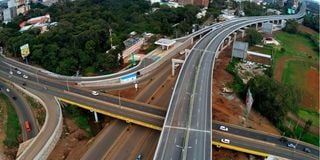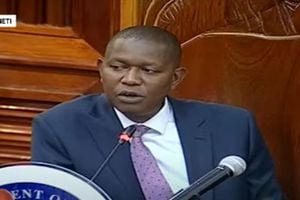Happening now: Liveblog: Final day of DP Rigathi Gachagua impeachment trial
Kenha to spend Sh42 million to beautify Mombasa Road

Nairobi Expressway along Waiyaki Way, Westlands.
The Kenya National Highways Authority (Kenha) plans to spend Sh42 million on the beautification of Mombasa Road from Athi River to Westlands.
Kenha Director-General Kungu Ndung’u on Monday told Parliament that two contractors had been hired to undertake the facelift.
He told the Senate Committee on Cohesion, Equal Opportunity and Regional Integration that the first contractor would undertake the sprucing up of the lower deck of the road from James Gichuru interchange to Ole Sereni Hotel interchanged at a cost of Sh18 million.
The second contractor, he said, will commence works from the Ole Sereni Hotel interchange to the Athi River at a cost of Sh24 million.
“We have hired two contractors to beautify Mombasa Road. We intend to undertake a facelift of the road given the importance of this artery, which is the gateway to Nairobi from the Jomo Kenyatta International Airport (JKIA),” Mr Kungu said.
“We are jointly working with Nairobi City County to improve the status of Mombasa Road. We know that the road from JKIA to the city center is poorly maintained.”
Mr Ndungu was responding to concerns raised by Tharaka Nithi Senator Mwenda Gataya who complained of the poor state of Mombasa Road yet the road is the face of Kenya from the airport.
Mr Gataya said that from the airport to the Central Business District (CBD), the lower deck of the road is dirty and bushy.
“The road is very dusty and bushy yet it is our entry point from the airport. This road is the face of Kenya and we need to know what KeNHA is doing to improve its status,” Mr Gataya said.
“How much have you set aside for the facelift of this very important road that visitors use to gauge the impression of the country.”
Mr Kungu told the committee chaired by Marsabit Senator Mohamed Chute that KeNHA has been undertaking repairs on the road and the drainage works is expected to be completed by November.
He said the authority would undertake the beautification once the works on drainage and other road repairs are completed.
Mr Kungu appeared before the committee that is inquiring into the status of the reservation of the 30 percent access to procurement opportunities for women, youth, and persons with disabilities.
Sections 56(3) and 157 of the Public Procurement and Asset Disposal Act, 2015 require public procurement entities to reserve a minimum of 30 percent of the procurable budget for the disadvantaged groups of women, youth, and persons with disabilities.
KeNHA revealed that it reserved Sh1.73 billion worth of procurement opportunities to the disadvantaged groups in the year 2023/24.
He said KeNHA had a procurement budget of Sh4.93 billion in the year under review and reserved 35 percent or Sh1.73 billion for the disadvantaged groups.
In the year 2022/23, Mr Kungu told Senators that KeNHA reserved Sh3.27 billion out of its total procurement budget of Sh10.43 billion for women, youth, and persons with disabilities.
“KeNHA ensures reservation of 30 percent of the procurable budget is allocated to the disadvantaged group,” Mr Kungu said.
“The procurable budget is calculated as the total budget less amounts for ongoing projects and other non-procurements such as salaries, utilities, training, and allowances.”
Mr Kungu said while determining the procurable budget to be subjected to reservation of the special groups, KeNHA does not consider development projects budget since bigger portion of the budget is externally funded and procurements guidelines of the development partners normally apply.
He said KeNHA monitors compliance through the preparation of quarterly status of implementation of the consolidated annual procurement plan to aid tracking of the adherence to approved budget allocations and categories of special groups.
“Some of the maintenance projects are technical in nature and require experienced contractors, with capacity and registered in higher categories of the National Construction Authority (NCA) 1,2 or 3,” Mr Kungu said.
“At times it poses challenges in the allocation of the 30 percent requirement since the majority of the disadvantaged group are still in the process of building capacity and quite a few of them are registered in the mentioned categories.”
Mr Kungu said budget cuts and revisions have also posed a challenge in allocation of the access to government procurement opportunities requirements.
He said budgets allocated to disadvantaged groups are significantly revised downwards, especially between mid and end of the financial year.





